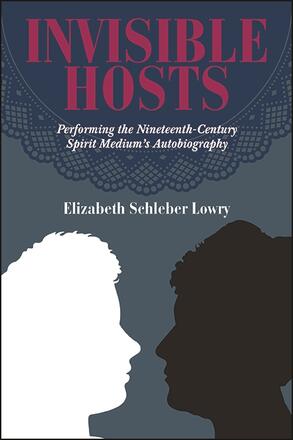
Invisible Hosts
Performing the Nineteenth-Century Spirit Medium's Autobiography
Alternative formats available from:
Provides a rhetorical analysis of female spirit medium's autobiographies in the historical and social contexts of Victorian era America.
Description
Finalist for the 2017 Foreword INDIES Book of the Year Award in the Religion category
Invisible Hosts explores how the central tenets of Spiritualism influenced ways in which women conceived of their bodies and their civic responsibilities, arguing that Spiritualist ideologies helped to lay the foundation for the social and political advances made by women in the late nineteenth and early twentieth centuries. As public figures, female spirit mediums of the Victorian era were often accused of unfeminine (and therefore transgressive) behavior. A rhetorical analysis of nineteenth-century spirit mediums' autobiographies reveals how these women convinced readers of their authenticity both as respectable women and as psychics. The author argues that these women's autobiographies reflect an attempt to emulate feminine virtues even as their interpretation and performance of these virtues helped to transform prevailing gender stereotypes. She demonstrates that the social performance central to the production of women's autobiography is uniquely complicated by Spiritualist ideology. Such complications reveal new information about how women represented themselves, gained agency, and renegotiated nineteenth-century gender roles.
Elizabeth Schleber Lowry is Lecturer in Rhetoric and Composition at Arizona State University.
Reviews
"Elizabeth Lowry's book, Invisible Hosts, is a refreshing change from a jargon-filled dissertation-turned-book. Not only does it have historical heft, but also it's an enjoyable read that offers both insightful analysis alongside an accessible introduction to spiritualism and the various scholarly lines of inquiry which situate it. " — Reading Religion
"The volume draws its strength in part from the depth and historical specificity of its dive into four primary sources … Invisible Hosts represents a solid new contribution to the field. Its overview of recent scholarship on Spiritualism will prove useful as an introduction, and its archival work will be of interest to scholars of religion and gender in the nineteenth-century United States. " — Legacy
"This brief study will benefit scholars of new religions, the history of feminism, and nineteenth-century American culture. It is a solid contribution to the growing body of scholarly work that is expanding our understanding of the significance of Spiritualism and its practitioners. " — Nova Religio
"There is much solid historical scholarship within these contents, and newcomers to the field will appreciate Lowry's clarity of expression and useful summations of key events in spiritualist history. " — Aries